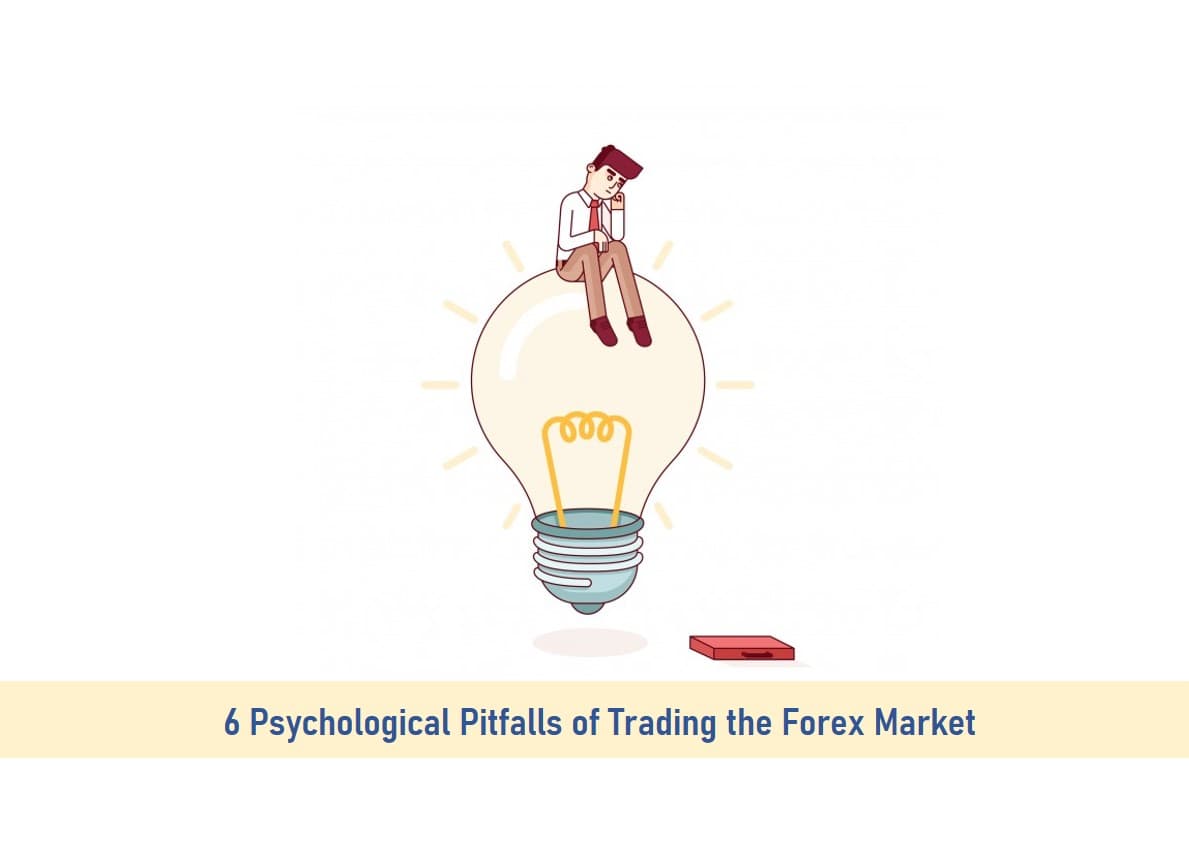
“The goal of a successful trader is to make the best trades. Money is secondary.” – Alexander Elder
Like every other aspect of psychology, the psychology of trading is the relationship between a trader’s mindset and how the mindset affects the decision he makes under various trading conditions.
Trading the Forex Market
Typically, trading the forex market requires the trader’s technical ability in determining the direction of the market.
The market direction then informs the trader’s decision on when to buy or sell. The decision to buy or sell is determined by the trader’s analysis and forecast of the market direction.
There are two major types of analysis; Fundamental and Technical Analysis. Technical analysis is also known as the study of Forex charts and strictly deals with the study of price charts and price patterns.
On the other hand, fundamental analysis deals with the study of economic data and how it affects the Forex market.
SEE ALSO: Master Price Action in Forex with these Simple Steps
SEE ALSO: What is Technical Analysis and Why is it Critical to Forex Trading?
Psychology of Trading and the Forex Market
Psychology of trading is an aspect of trading that has nothing to do with technical or fundamental analysis but has everything to do with a trader’s emotions and mindset.
Since we are social beings, psychology comes into play when interacting with the Forex markets. Beyond what we can see, our emotions influence how we approach the Forex market.
Past trading experiences also form the bedrock of how we think, and this plays an important role in the outcome of our decisions. Psychology also differentiates a rookie from an experienced trader who has been in the pits and seen it all.
Psychology of trading examines the emotional and mental reaction of traders when trading and explains what influences the character, and behavior of traders under different psychological conditions.
It is almost impossible to be a consistently successful trader relying only on technical and fundamental analysis alone. But these two aspects of analysis also require a well-developed psyche to understand and interpret correctly.
Importance of Trading Psychology
Technical and Fundamental analysis skill plays vital roles in the forex market, but many traders from experience still fail with their knowledge in these two aspects.
The knowledge and application of the psychology of trading have proven to be the common denominator of successful traders.
A famous successful commodity trader called Richard J. Dennis once said;
“We could post our trading rules on the front page of the wall street journal, and still people would not be able to make money from them”.
He also said; “To follow the good principles and not let fear, greed, and hope to interfere with your trading is tough, you’re swimming upstream against human nature.
There is nothing quite as good or bad as trading”. Trading requires overcoming emotions which are eminent especially when money is involved.
Tom Hougaard, an expert in trading psychology in an interview, stated that;
“successful traders are traders who have realized that successful trading is not just about the chart or fundamental analysis, but rather about how they think when they are in a position either winning or losing”.
The Forex market is a volatile market that does not respect people’s emotions but sound technical principles and analysis.
SEE ALSO: 5 Smart Ways to Approach Fundamental Analysis
SEE ALSO: A Beginner’s Guide – How To Analyze 3 Types of Forex Charts
Psychological Trading Pitfalls in the Forex Market

Many psychological trading pitfalls affects traders in the forex market, but the most common ones are:
Poor Risk Management
A simple and well-proven approach to successful speculative trading is: Cutting losses short and letting the profits run.
Most people cannot deal with this simple principle because of their emotions. Many traders have trouble taking small losses and as a result, small losses turn into moderate losses, which becomes even harder to take.
Finally, the moderate losses turn into big losses which then they are forced to take, all because it was hard for them to take a small loss.
Similarly, when people have a trade running in profit they want to take the profit right away.
Many traders are tempted to take the little profits before it gets away and the bigger the profit becomes, the harder it is to resist the temptation to take.
They prefer a sure smaller gain while holding on to losses with the hope that the market turns around in their direction. Eventually, this results in traders cutting their profits short and letting their losses run.
Revenge Trading
This is a psychological trading pitfall where a trader goes to the market to avenge losses, in an aggressive manner that goes against their trading plans and strategy, with the hope of making a recovery. This mistake has proven to have more failure rate than success.
This practice is emotionally driven and always results in making inconsequential decisions which may then lead to more losses or losing the entire trading account. When a trade is on a revenge trading mission the trader may react to the market by increasing their lot sizes, take more positions or even take trade setups that are not well analyzed.
Trading profitably requires consistency, a trader should be able to stick to their plans regardless of the losses they might have incurred from previous trades and not emotions drive them to make decisions.
Fear
The psychological impact of fear in trading can present itself in many ways in the forex market. Some of which are;
The fear of losing; will always make a trader lose more. Losing is not avoidable intrading. The only thing a trader can do is to ensure that the winning trades are more than the losing trades or have a good risk to reward ratio.
Fear of losing trade must be overcome to take profit from the winning trades. Losses in trading must be welcomed as part of trading and taken as a lesson·
Fear of giving back your profit: this is what makes traders close a winning tradeprematurely because of the fear of the market taking their profit.
Traders in fear will close a winning trade simply because the profit is reducing due to market correction or retracement to forfeit the greater profit if only they could hold the trade.
Fear of Missing Out (FOMO):
The fear of missing out arises as a result of a trader’s fear of missing a trading opportunity.
Traders with this mindset may enter a trade every possible trade or enter a trade when they have missed the right entry, all to ensure they take the opportunity of every possible trade.
A trader should not FOMO into a trade, setup should not be traded and once a trade is missed or not certain, the trader should let it go. The market is always there with many other opportunities. A trader must have a target and stick to it.
SEE ALSO: 5 Traits of a Forex Trader You Should Copy
SEE ALSO: How To Use A Forex Lot Size Calculator Like A Pro
Gambler’s Fallacy
Although trading is not gambling, many traders are trapped by the gambler’s fallacy. The gambler’s fallacy is thinking, that a series of events will somehow affect the outcome of the next event.
In this situation, a trader may decide to take a trade believing that after a roll of losses, the next will be in their favor or a win.
Technically, this action implies that the trader is increasing their risk on the next trade that has the same probability of success as all the ones that they have lost.
The psychological hack to overcome this pitfall is to understand that there is no connection between trades taken either the winning trade or the losing one.
Every trade is independent and every trade must be treated independently from other trades. And the more losses incurred the more chances that a trader may make the wrong trading decision or incorrect analysis from the emotional stress of losing.
Greed
Greed is probably one of the biggest obstacles a trader will have to overcome. The mindset to get rich on every trade will more likely end up blowing up an account.
The aim should not be to get rich in a day or from trade but to be a consistently profitable trader. Greed is expressed in various ways but must expressly, greed does not allow traders to adhere to proper risk management (PRM).
Greed when compared with other emotional factors in trading, is the most dangerous emotion for traders, even worse than fear.
Fear can stop trading from taking a trade or quitting a trade prematurely. In comparison, fear is conservative on the capital, on the other hand, greed pushes a trader to act in ways that they shouldn’t.
Greed can prompt a trader to act irrationally, like gambling a trade. Other expressions of greed are in the form of over-leveraging, over trading, chasing the markets, or holding on to trades that should have been exited long ago.
Final Thoughts
A common psychological quote states that “we don’t see things the way they are, rather we see things the way we are”.
This also applies to the forex market. Emotions play a vital role in trading although it has nothing to do with the chart or economic data, yet if a trader is in a wrong emotional state.
The technical and fundamental analysis will only confirm their emotional state and their decisions will be influenced by their emotion.
Psychology of trading helps a trader to overcome what is also called the deception of charts which implies that, our eyes will seek out that which confirms the fact we are seeking to prove or support, creating a bias on what we have already established.
Psychology of trading in the forex market addresses various emotional issues that may interfere with trading and helps traders to build the correct mental module and defense in approaching the market to be a consistently profitable trader.
A trader must be in the right psychological state before applying technical or fundamental analysis skills to take a trade.
Image credit: Business vector created by vectorjuice – www.freepik.com
Read More




